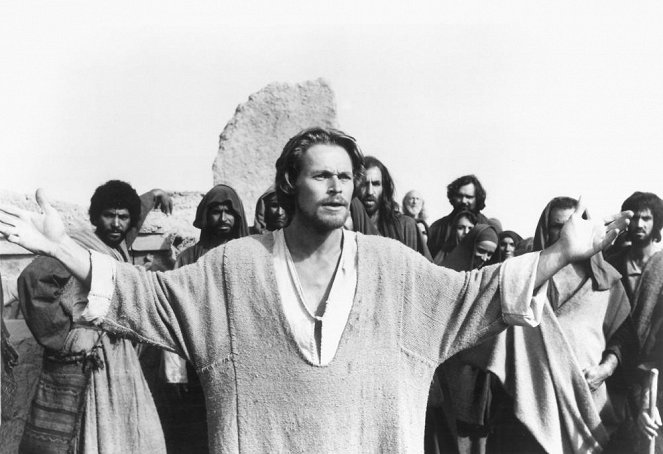Directed by:
Martin ScorseseScreenplay:
Paul SchraderCinematography:
Michael BallhausComposer:
Peter GabrielCast:
Willem Dafoe, Harvey Keitel, Verna Bloom, Barbara Hershey, Roberts Blossom, Gary Basaraba, Barry Miller, Paul Greco, Irvin Kershner, Victor Argo, John Lurie (more)VOD (3)
Plots(1)
Based on Nikos Kazantzakis' novel of the same name. The carpenter, Jesus of Nazareth, tormented by the temptations of demons, the guilt of making crosses for the Romans, pity for men and the world, and the constant call of God, sets out to find what God wills for him. But as his mission nears fulfilment, he must face the greatest temptation; the normal life of a good man. (Mediumrare Entertainment)
(more)Reviews (6)
A brilliant reflection on the nature not only of Christianity, but of faith in general. A film with a thought-provoking screenplay that shatters the conventional views of dogmatic individuals who may not like Scorsese's thoughtful, different view of the figure of Jesus Christ. It’s also brilliant visually. The crucifixion scene is compositionally stunning, and note also that in the Stations of the Cross to Golgotha Scorsese was inspired by the paintings of the old Dutch masters, I mean the posture of the people, their gestures and expressions. I consider the burning down of cinemas by radical Christian groups at the premiere of the film to be the result of a profound misunderstanding of Scorsese's seminal work. PS: Gabriel's unconventional soundtrack is equally brilliant.
()
Admiration and disinterest, but that’s already characteristic of my approach towards the films of Martin Scorsese. Objectively, I acknowledge that they are perfectly executed, but I’m simply unable to fully enjoy them. I’m giving The Last Temptation of Christ a fairly high rating mainly because of the surprise at the end – a very smart script – but I’m not likely to watch it again.
()
Rather than a classic novel, Kazantzakis' book is a philosophical-theological summation of the nature of human belief in God, and of religion as such. It must have been clear to Scorsese that if he didn't want to bore the viewer with a five-hour colossus, he had to extract only a straightforward plot skeleton and it would be up to him alone how much of the motif of the Messiah as a simple man he would cram into the film. I don't want to poke at it, but I wonder how many of the people who are giving this work full credit have also read the actual book. At the beginning of every dialogue, in every subsequent scene, I waited for Scorsese to finally unleash that (according to the reactions at the time) blasphemously heretical confession... and nothing happened and then the end came. I certainly don't see the director's excessive religiosity behind all the restraint - the provocateur has always been timeless - but rather it is the limited means of the film medium that simply and easily fail to capture the idea, however great the effort. So to all those praising this work, I am extremely happy for you and I even tip my hat to the great Marty for having the courage to take on such a project. But for me, Kazantzakis' book (which occupies a place of honor in my library) will always be so essential that I simply cannot rate the film any other way, even though it is cinematically absolutely perfect!
()
The Last Temptation of Christ is Scorsese’s best non-Mafia picture. Need I say more? Need I emphasize Dafoe and Keitel’s performances of their lives? Or the atmospheric soundtrack? Do I really have to mention the theological level of this picture and its philosophical aspects that will remain troubling you long after? Describe the wave of outrage of the general public (I recommend the book Banned Films)? No, I think that there isn’t much point and it would be like taking coals to Newcastle... And anyway, this is one of those rare examples where the movie adaptation is better than the (already excellent) book it’s based on.
()
A purely personal affair that could not catch me in any way. Also, comparing it to Mel Gibson's torture-porn is definitely not appropriate. Intellectually and aesthetically, this is a completely different film that attempts to say something different in a distinct form.
()
Martin Scorsese and his version of Christ's journey to Golgotha. The ending had to be very controversial, but it is clear that both the author of the original material and the filmmakers themselves contemplated over the entire essence of Christ as a symbol. Did he really want to be that symbol? A great depiction of the fact that even Jesus was human, just like anyone else, that he had doubts. The symbol was born out of a person, a real figure, but why couldn't a symbol be created by someone else's account? Is the Bible a text sent by God? Someone had to write it. Of course, Christianity, just like any other religion, is made up, but as we can see, it is well made up.
()

